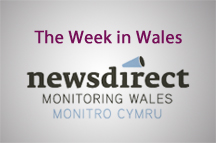 Wales is a small nation but getting around it is a big headache. Journeys from north to south inevitably involve twisty back roads and train journeys often take you in to England and / or involve Pacer trains which began their lives as buses. Wales’ single airport is good and improving but it’s only really an option if you live near Cardiff.
Wales is a small nation but getting around it is a big headache. Journeys from north to south inevitably involve twisty back roads and train journeys often take you in to England and / or involve Pacer trains which began their lives as buses. Wales’ single airport is good and improving but it’s only really an option if you live near Cardiff.
With much to be improved, transport was the big issue this week.
The Welsh Government’s plans for an M4 relief road which would ease congestion around Newport were heavily criticised by Labour backbencher, Lee Waters. Speaking on Sunday Politics, Mr Waters questioned spending £1bn on a single project which could fall foul of the Welsh Government’s own sustainability legislation, the Wellbeing of Future Generations Act.
Economy Secretary Ken Skates outlined a major programme of road improvements in north Wales. A topical question saw AMs debate Uber’s license.
Invites to tender for the Wales and Borders rail franchise also went to rail operators this week. The invitation had been expected in August but was delayed following disagreements between the UK and Welsh governments over the devolution of necessary powers.
There is a growing sense of weariness around this project and the development of the South Wales Metro, both of which were debated on Wednesday in the Senedd.
A lack of investment and a lack of cooperation between the UK and Welsh governments are major road blocks in the development of an efficient transport network in Wales. Given a magic money tree and a harmonious working relationship between Whitehall and Wales is unlikely to arrive any time soon, what can politicians in Wales do to improve journey times and transport connectivity?
AMs may well have stumbled on a partial solution (although I’m not sure they realised it) when they briefly debated the Welsh Government’s Open Data Strategy on Tuesday. There was general support for the Strategy, which is not hugely ambitious compared to the UK Government’s, but a solid start nonetheless. Speaking in the debate, Plaid AM Adam Price rightly noted that open data can be very powerful in driving improvements in transport networks.
This is evidenced by recent work undertaken by Transport for London – one of the leaders in the publication of open data. Faced with a constrained budget, aging infrastructure and growing passenger numbers, TfL has made information it holds available to developers and service providers, enabling them to inform the public and themselves on multiple aspects of TfL’s operations thus reducing pressure and improving integration.
So instead of lamenting the lack of a fast lane, perhaps AMs should look at taking the road less travelled and consider how data could be made available to make journeys flow. Yes, the gains would be marginal, but surely it’s better to make a little progress than stay stuck in traffic.














